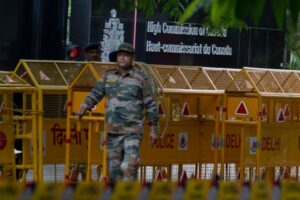 MOON Desk: India has told Canada to withdraw dozens of diplomats from the country, in an escalation of the crisis that erupted when Prime Minister Justin Trudeau said New Delhi may have been linked to the murder of a Canadian Sikh. Ottawa has been told by New Delhi that it must repatriate roughly 40 diplomats by October 10, according to people familiar with the demand. One person said India had threatened to revoke the diplomatic immunity of diplomats who remain after that date. The Canadian foreign ministry and the Indian government declined to comment. New Delhi has previously said it wanted “parity” in the number and grade of diplomats each nation posts to the other.
MOON Desk: India has told Canada to withdraw dozens of diplomats from the country, in an escalation of the crisis that erupted when Prime Minister Justin Trudeau said New Delhi may have been linked to the murder of a Canadian Sikh. Ottawa has been told by New Delhi that it must repatriate roughly 40 diplomats by October 10, according to people familiar with the demand. One person said India had threatened to revoke the diplomatic immunity of diplomats who remain after that date. The Canadian foreign ministry and the Indian government declined to comment. New Delhi has previously said it wanted “parity” in the number and grade of diplomats each nation posts to the other.
Canada has several dozen more diplomats at its high commission in New Delhi than India has in Ottawa, because of the big consular section needed for relatives of the roughly 1.3mn Canadians who claim Indian heritage. One person said Canada had 62 diplomats in India and that New Delhi had told them to reduce that by 41 people. New Delhi already announced a visa ban for Canadians the day after Trudeau made his bombshell claim on September 18.
Trudeau’s claim followed frustration in Ottawa that weeks of secret diplomacy with India had failed to secure its co-operation with the police inquiry into Nijjar’s murder. The diplomacy included two trips by Canadian national security adviser Jody Thomas to India to discuss the issue ahead of the G20 in New Delhi in September. India did not admit involvement in the murder but did not deny the claim, according to people familiar with the meetings.
The Indian government said it had rejected the allegations. The murder was also the focus of Trudeau’s meeting with India’s Prime Minister Narendra Modi at the G20, when the Indian side flatly refused a request for co-operation. In earlier meetings, India had even urged Canada to halt the inquiry, according to people familiar with the case. India’s foreign minister S Jaishankar said in Washington last week that the alleged assassination was “not consistent with our policy” and accused Canada of indulging Sikh separatists agitating for an independent state in India.
Canadian media have reported that Ottawa has intercepts of conversations involving Indian diplomats that point to official involvement in Nijjar’s shooting last June. India has denied seeing any such evidence. Ottawa is limited in what it can share with the Indian government, partly to protect the sources and methods used to collect the intelligence, but also to avoid compromising the murder investigation, according to people familiar with the matter.
The constraints meant Thomas and other officials who visited India, including Canadian Security Intelligence Service head David Vigneault, had only been able to present the evidence verbally to their Indian counterparts.
This is about sovereignty, so it had to be the PM [making the statement],” said one of the people. Recommended Gideon Rachman, why the west cannot turn a blind eye to a murder in Canada Roland Paris, a foreign policy expert at the University of Ottawa, said the nature of the allegations had left Trudeau with little choice. “There is a sense in Canada that bad things happen elsewhere, but this murder has really punched into the public consciousness,” said Paris.
“It is not something Canada or Canadians are going to brush aside or forget.” Richard Fadden, a former head of the CSIS who served as Trudeau’s national security adviser, said he had been surprised by the prime minister’s move. “I thought he must be absolutely certain about the evidence.” While some Canadian critics were initially disappointed by the reaction of its international allies to its “credible allegations” against India, the tone has shifted.





